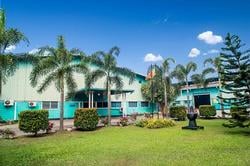
GRI presented Presidential Award for sustainability
There are some sectors of industry that are often considered ideal candidates for the justifiable movement towards environmental sustainability for the vision of a better tomorrow. Many manufactures however, are not included in this and are criticized for their lack of policies to control pollution. Several manufacturers are known to flout the rules and pollute the environment, often causing chronic health problems and environmental damage, making the issue of industrial pollution into a severe one.
GRI– Striving to prove us all wrong
GRI, a manufacturing company founded over one and a half decades ago in Sri Lanka, has however refused to take the backseat to this catastrophe; on the contradictory GRI strives to prove the above cliché wrong. The leading industrial tire manufacturer is ISO 9001:2015 and ISO 14001:2004 – an Environmental Management System (EMS) certification stating a set of processes and practices that enables an organization to reduce its environmental impacts and increase its operating efficiency.
From warehouses to ports to construction sites; GRI offers industrial tire solutions for various applications. In January 2017, GRI laid the foundation for the construction of its second specialized tire factory in Badalgama, Sri Lanka, on 10 acres of land, adjacent to its current solid tire factory. With a footprint of 100,000 square feet, the new GRI factory will be the largest in Sri Lanka dedicated to produce specialty tires, and the first to produce radial agriculture tires.
Process
Waste Management
The key objective at GRI is to contribute to the economy that is sustainable rather than wasteful or polluting, and by doing so GRI is considering the well-being of not only the society but also the generations to come. GRI makes certain that all material used in the manufacturing process are contained and therefore do not affect soil or earthly matter. However, when taking into consideration waste disposal, it can be argued that GRI has a fair amount of waste material; this waste material is classified into Avoidable and Non-avoidable waste. At GRI, all avoidable material waste is recycled to produce an environmentally friendly, value added product which is considered a green solution. Rejected tires and compounds are converted into ‘buffing dust’ also known as ‘rubber crumb’, or into reclaim rubber.
Precautions against air pollution
The curing process of a tire is the final stage of the manufacturing process. GRI has taken the initiative to procure and utilize biomass boilers, where only by-products of wood industry such as saw dust and outer planks are used. Biomass boilers ensure complete combustion of the biomass, hence significantly lowering the generation of carbon gases.
The achievement of energy saving
About three-quarters of the electricity generated in the Sri Lanka comes from thermal power stations; taking this aspect into consideration, GRI has not only limited their efforts to securing sustainability levels within its manufacturing premises, but also work to reduce the need for more fossil fuel combustion in power station. To achieve this feat, GRI worked to reduce its per Kg unit consumption of electricity and implemented best practices, online energy monitoring systems were installed in all machines in the factory and in-depth energy consumption evaluations and assessments were made prior to purchasing these machines.
Impact and identifying the next steps
As GRI utilizes the renewable raw material produced by the wood industry in its manufacturing process, therefore considering future the generations, the company has conceptualized a tree planting project, both inside and outside factory premises. In addition to this, GRI has taken the responsibility of treating its waste water and sewerage via a treatment plant for all waste water generated, the treated waste water is then used for machine cooling and gardening purposes.
GRI has taken the steps of ecologically awareness – all of which have proved to enhance the recognition and realization towards a cleaner and brighter future; and in doing so the company has aided in the development of the Sri Lankan economy. In recognition of this GRI was Awarded the ‘Presidential Award for Sustainability amongst the Export Industry in Sri Lanka 2016’.









